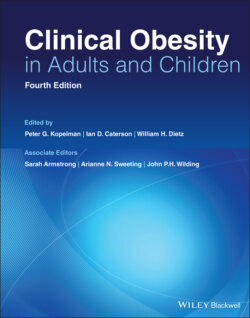Читать книгу Clinical Obesity in Adults and Children - Группа авторов - Страница 99
Teasing and bullying
ОглавлениеExperiencing weight‐based victimization (such as teasing, bullying, or harassment) has been linked to greater psychological distress in youth, including increased depressive symptoms, irritability, social anxiety, body dissatisfaction, loneliness, suicidal ideation, and suicide attempts, as well as poorer self‐esteem and self‐compassion, when compared to peers who have not reported weight‐based victimization [53,58,90–94]. In a study of over 10,000 youth (mean age = 12 years), in‐person bullying (though not cyberbullying) mediated the association between BMI and several markers of psychological health, including how often youth had felt low, irritable, nervous, dizzy, had a bad temper, or had trouble sleeping [58]. This finding suggests that many psychological factors typically associated with childhood obesity (e.g. depression) may be explained predominantly by weight‐based victimization.
Youth who report weight‐based teasing and bullying are also more likely to engage in risky or unhealthy behaviors when compared to peers who do not report such experiences. For example, weight‐based teasing and bullying are associated with increased odds of using cigarettes or engaging in self‐harm behavior in both male and female adolescents [55]. For male adolescents, weight‐based victimization is also associated with increased odds of using alcohol or marijuana [55]. Many adolescents who experience weight‐based victimization also develop maladaptive or disordered eating behaviors. Project EAT (Eating and Activity in Teens and Young Adults) is an ongoing longitudinal study exploring behavioral, psychological, and socioeconomic variables related to weight and eating in youth. Baseline measurements in Project EAT were collected from over 1000 respondents who had a mean age of 14 years, and follow‐up assessments are administered at regular intervals to identify key eating and weight patterns in adolescent development, as well as the long‐term outcomes of these behaviors. In a 5‐year follow‐up study that controlled for age, race/ethnicity, socioeconomic status, and BMI, weight‐based teasing predicted greater subsequent rates of binge eating, frequent dieting, and unhealthy weight control behaviors such as skipping meals or using food substitutes [95]. In a more recent 15‐year follow‐up study, many of these findings remained for adult women, and some remained for men. Women who experienced adolescent weight‐based teasing had two times greater odds of using unhealthy weight control behaviors (e.g. skipping meals, using diet pills, purging, etc.) and 2.15 greater odds of using eating as a coping strategy when experiencing negative feelings. Effects tended to differ depending on the source of adolescent teasing; women who had been teased by family members (rather than peers) reported lower body satisfaction and 1.6 times greater odds of dieting in the last year. For men, weight‐based teasing from peers (rather than family) predicted eating as a way to cope and lower body satisfaction in adulthood [96]. Thus, adolescent experiences of weight‐based teasing may have a lasting impact on body image and maladaptive eating patterns in adulthood.
Weight‐based teasing may also lead to reduced engagement in health‐promoting behaviors, such as physical activity. For girls especially, experiencing weight‐based teasing in gym class is linked to avoidance strategies such as skipping gym class [49]. Greenleaf et al. [90] surveyed 1419 middle school students about experiences of weight‐based teasing and self‐efficacy for physical activity. Youth were also asked to rate their physical self‐concept, measured by how much they agreed with statements such as “I am a physically strong person” or “I can run a long way without stopping.” Controlling for BMI and other demographic characteristics, students who reported experiences of weight‐based teasing reported lower levels of self‐efficacy and physical self‐concept when compared to peers who had not experienced teasing. In this same study, weight‐based teasing was also associated with poorer performance on objectively measured physical fitness, such as completing fewer laps during the endurance portion of state‐mandated physical fitness tests [90]. More data are needed to determine whether weight‐based teasing is also associated with obtaining reduced amounts of objectively measured physical activity.
As with discrimination, recent evidence suggests there may be a negative association between weight‐based teasing and bullying and overall physical health. For example, weight‐based victimization is associated with an increased frequency of somatic symptoms, such as headaches, stomachaches, and backaches [58]. Longitudinal investigations highlight the negative health impact of weight‐based teasing and discrimination over time. Rosenthal et al. [97] surveyed 644 students and found that across a 2‐year period from 5th or 6th grade to 7th or 8th grade, those who reported more frequent experiences of race‐ and weight‐based bullying had greater increases in blood pressure and BMI, as well as poorer self‐assessments of health. In another 15‐year study of 110 children and adolescents, weight‐based teasing was associated with a 33% per year increase in BMI and 91% per year increase in fat mass in youth with obesity or at risk for obesity [98]. Data from Project EAT illuminate similar patterns of weight gain over 15 years. Women who reported weight‐based teasing in adolescence had greater odds of having a BMI >30 kg/m2 than women who had not been teased in adolescence, even after controlling for baseline weight status, socioeconomic status, race/ethnicity, and age. These odds differed depending on the source of weight‐based teasing; odds of elevated BMI in adulthood were 1.8 times greater if women reported adolescent experiences of teasing from peers and 2.58 times greater if the adolescent experiences of teasing came from members of their family [96].
